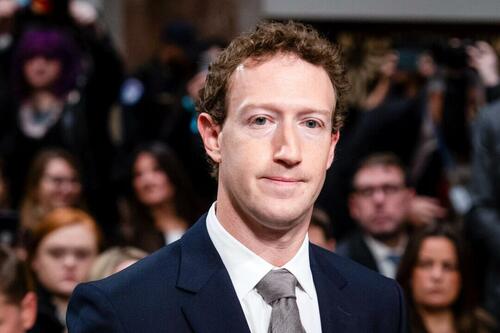Court Rules Meta Must Face Lawsuit Over Fraudulent Ads
Authored by Zachary Stieber via The Epoch Times (emphasis ours),
Facebook parent company Meta must face a lawsuit over claims it breached its terms of service by soliciting fraudulent advertisements from Chinese companies, a federal appeals court has ruled.
Christopher Calise and Anastasia Groschen sued Facebook in 2022 after they bought items advertised on Facebook. Mr. Calise’s car engine assembly kit did not arrive. Ms. Groschen’s toddler activity board did arrive, but it was a puzzle, not a board.
The pair said Facebook was unjustly enriching itself and being negligent by not only accepting but soliciting ads from scammers. That included efforts to solicit ads from China-based advertisers, despite internal data indicating nearly three-in-10 such ads violated one or more Facebook policies.
They also said that Facebook was breaching the contract it made with users when it stated in its terms of service that if it learned of harmful conduct, “we will take appropriate action,” but instead solicited, encouraged, and assisted deceptive advertisers.
The entire case was thrown out by U.S. District Judge Jeffrey White, who ruled the claims were barred by Section 230 of the Communications Decency Act.
However, Judge White was wrong to toss the breach allegations, according to the new ruling, which came from a panel of the U.S. Court of Appeals for the Ninth Circuit.
Section 230 confers immunity on providers “of an interactive computer service” for “information provided by another information content provider.” The law bars treating the providers “as a publisher or speaker” in such cases.
But Meta “has failed to meet its burden of showing that § 230(c)(1) applies to plaintiffs’ contract-related claims, because these claims do not ’seek to treat [Meta] as a publisher or speaker,’” U.S. Circuit Judge Ryan Nelson, writing for the majority, said.
“To the extent that Meta manifested its intent to be legally obligated to ’take appropriate action’ to combat scam advertisements, it became bound by a contractual duty separate from its status as a publisher. We thus hold that Meta’s duty arising from its promise to moderate third-party advertisements is unrelated to Meta’s publisher status, and § 230(c)(1) does not apply to plaintiffs’ contract claims,” he added later.
The appeals court remanded the case back to Judge White.
“Discussions of a narrower application of Section 230 coming from the Ninth Circuit are encouraging,” Courtney Maccarone, a lawyer for the plaintiffs, told The Epoch Times in an email. She added, “We look forward to continuing to pursue our clients’ claims in district court.”
Meta did not respond to a request for comment.
The claims regarding unjust enrichment, negligence, and state business law were correctly judged as falling under Section 230 immunity because there was not enough evidence to show Meta “materially contributed” to the ads, Judge Nelson said.
“Without more allegations of Meta’s contribution, its ’solicitation‘ or ’assistance’ for advertisers—a fundamental part of Meta’s business model and that of countless other internet companies—does not undo § 230(c)(1)’s protections just because it could be misused by third parties,” he wrote.
Judge Nelson was joined by U.S. Circuit Judges Jacqueline Nguyen and Eugene Siler Jr.
Judge Nelson was appointed under President Donald Trump, while Judge Nguyen received his appointment from President Barack Obama. Judge Siler was appointed by President George H. W. Bush, and Judge White was appointed by President George W. Bush.
In a concurring opinion, Judge Nelson said that it was time to reconsider the sweeping immunity that courts have ruled Section 230 gives to Facebook and other Big Tech companies. He pointed to Supreme Court Justice Clarence Thomas’s statement in 2020 that said courts have stretched the protection from publishers and speakers to distributors, thus granting immunity “even when a company distributes content that it knows is illegal.”
“These courts argue that this rule encourages ’self[-]regulation,’” Judge Nelson said. “But as plaintiffs have plausibly pled, when an internet company has an economic incentive to permit unlawful content to be posted by third parties, it seems to encourage the opposite—willful blindness.”
The broad immunity also conflicts with other laws, including one that imposes liability for knowingly displaying obscene material to children, the judge said, and has resulted in protecting companies displaying such material and even facilitating terrorism.
“These applications stretch the statute’s plain meaning beyond recognition. And they will continue to occur unless we consider a more limited interpretation of § 230(c)(1)’s scope of immunity,” Judge Nelson said. “In a world ever evolving and with artificial intelligence raising the specter of lawless and limitless protections under § 230(c)(1), we should revisit our precedent and ensure we have grounded its application.”
Tyler Durden
Mon, 06/10/2024 – 11:25

